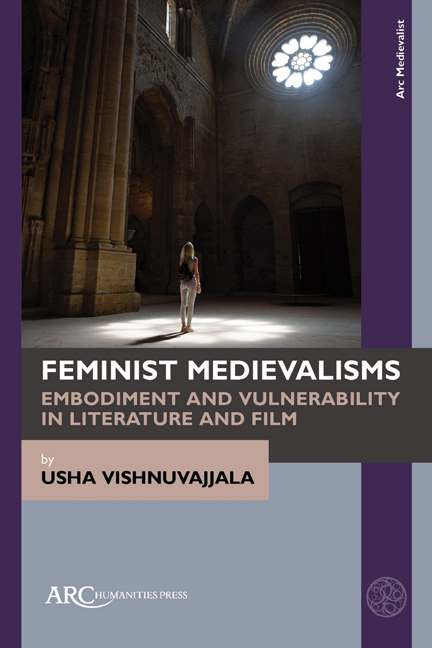Book contents
- Frontmatter
- Contents
- Acknowledgements
- Introduction
- Chapter 1 Nested Medievalisms and Affected Bodies in Jane Austen’s Northanger Abbey
- Chapter 2 Feminism and Medievalism in Woolf’s Final Works
- Chapter 3 Medievalism as Feminist Sanctuary in the late Twentieth Century
- Chapter 4 Chaucer, Vulnerable Bodies, Somatophobia, and Theory
- Conclusion: Feminisms and Medievalisms
- Select Bibliography
- Index
Chapter 4 - Chaucer, Vulnerable Bodies, Somatophobia, and Theory
Published online by Cambridge University Press: 28 March 2024
- Frontmatter
- Contents
- Acknowledgements
- Introduction
- Chapter 1 Nested Medievalisms and Affected Bodies in Jane Austen’s Northanger Abbey
- Chapter 2 Feminism and Medievalism in Woolf’s Final Works
- Chapter 3 Medievalism as Feminist Sanctuary in the late Twentieth Century
- Chapter 4 Chaucer, Vulnerable Bodies, Somatophobia, and Theory
- Conclusion: Feminisms and Medievalisms
- Select Bibliography
- Index
Summary
IN THIS final chapter, I turn from examining feminist narrative engagements with medievalist embodied vulnerability to considering how the idea of embodied vulnerability has carried dual negative and redemptive connotations—both gendered—since the late Middle Ages. I argue that these connotations, especially the negative ones, have become particularly entrenched in certain English-speaking contexts and have shown up in surprising places in the last few decades. This chapter will look at the effects of this in US political discourse of the late twentieth and twenty-first centuries, picking up where Chapter 3 ended, and then at its history in political thought and philosophy. In order to do so, I begin in the fourteenth century with a notable example of a text treating truth as gendered, demonstrating that we have long been inclined, particularly in English, to determine whether something is “true” or not by who it comes from rather than on its own merits. By re-examining one specific literary instance of embodied vulnerability functioning in a gendered way that has both negative implications and redemptive possibilities—that of Dorigen in Chaucer’s “Franklin’s Tale,” who makes a rash promise to a squire named Aurelius to be “his”—and then tracing the reemergence of those negative and redemptive possibilities in recent decades, I demonstrate that the specific misogyny around the idea of “truth” in recent US politics, as well as the resistance to that misogyny, are continuing a debate that dates back to the fourteenth century.
Scholarly debate on the morality, legality, and enforceability of Dorigen’s rash promise to Aurelius has long been contentious, especially with respect to the word and concept of trouthe. I argue that this is in part because our reading of Dorigen’s conflicting trouthes in the tale depends on our reading of her embodied vulnerability and the way other characters respond to it; what seems like a legal or contractual debate is actually one about bodies, affects, and emotions. If her embodied vulnerability—what some might see as her weak feminine body, incapable of fidelity to oaths—is merely a liability, this reinforces the legalistic imperative that she keep her promise to Aurelius, even though she made it “in pley.”
- Type
- Chapter
- Information
- Feminist MedievalismsEmbodiment and Vulnerability in Literature and Film, pp. 95 - 126Publisher: Amsterdam University PressPrint publication year: 2024

